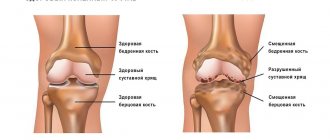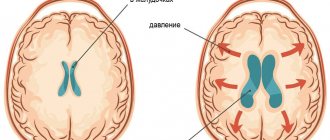Symptoms of visual impairment
There are many signs of visual perception disorder. The most common ones are listed below:
- sparks, stars, flashes before the eyes;
- decreased visual acuity;
- impaired distance or near vision;
- feeling of “veil” or “sand” in the eyes;
- doubling of objects;
- pain and lacrimation;
- decreased twilight vision;
- rapid fatigue during hard work;
- impaired perception of light and colors;
- lateral vision disorder.
In most cases, symptoms of vision impairment develop over several years. Less often, a person is faced with a situation where vision deteriorates sharply. This requires immediate examination to exclude life-threatening pathologies.
Deterioration of visual function is always accompanied by a negative psychological state. Often against this background, headaches, poor health, lethargy, noticeable changes in behavior, and depression develop. Sometimes a decrease in vision characterizes a disease of another organ. In this case, it may be accompanied by the following symptoms:
- dizziness;
- persistent headache, often localized in a specific area (temporal, occipital, etc.);
- weakness in the limbs and body;
- nausea, vomiting;
- noise in ears;
- pain in the cervical spine, etc.
Therefore, the diagnosis and treatment of eye abnormalities should be carried out by an ophthalmologist, often together with other specialists.
Color blindness test
Look carefully at the pictures and say what you see in them.
Picture No. 1 Picture No. 2
Picture No. 3 Picture No. 4
Picture No. 5 Picture No. 6
If the pictures are not visible or there are doubts about the clarity of the numbers or figures depicted on them, then there is no need to be scared, but just go through an examination at the Optic Center.
Sign up for a comprehensive examination
Causes of decreased vision
The life of a modern person is such that every day he is faced with many factors that provoke visual impairment. The most significant of them can be identified:
- Lack of eye muscle training . In order for the optical system of the eye to adequately project an image onto the retina, impeccable functioning of the eye muscles is necessary. Long-term fixation of the gaze on a nearby object (book, phone, PC) leads to weakening of the muscular system.
- Age-related changes . The structure of the retina includes a special pigment (rhodopsin), which is responsible for the perception of images. In older people, its content is reduced, so they see worse than young people. With age, the ability of the lens to change shape also decreases, which causes senile farsightedness.
- Circulatory disorders . Visual function depends on the adequacy of the delivery of oxygen and nutrients to the cells of the eye.
- Prolonged increased eye strain . In dim or bright light, the eye structures work in a state of overload. This leads to their wear.
- Blue spectrum of light . Scientists have proven that prolonged exposure to short waves of light triggers a series of photochemical reactions in the retina with the release of free radicals that destroy its structure. Therefore, the harm of a computer, gadgets, TV, and bright fluorescent lamps is undeniable.
- Drying of the mucous membrane of the eye . Rare blinking, which is often observed while working at a computer, leads to insufficient washing of the mucous membranes with special moisture and, as a result, visual impairment.
Doctors conditionally divide the causes of visual impairment according to the nature of their origin into ophthalmological and not related to eye pathology. Among the main eye provocateurs, the following categories are distinguished:
- injuries - damage, burns;
- hemorrhage, detachment, rupture, retinal degeneration;
- infections – conjunctivitis, keratitis, blepharitis, etc.;
- insufficient blood circulation;
- disturbance of innervation - loss of sensitivity of the optic nerve;
- change in the shape of the eyeball - myopia, hypermetropia, astigmatism.
Other causes of deterioration in visual acuity are associated with heredity, pregnancy, the formation of brain tumors, insufficient blood circulation in the cervical spine, skull injuries, and endocrine pathologies. The lifestyle and nutrition of a person also plays a significant role. Thus, alcoholism, drug addiction, smoking, lack of sleep, lack of vitamins A, D, E, and proteins lead to the destruction of eye cells.
From the above, it becomes clear that a person’s professional activity also affects visual acuity. Therefore, the following specialties are at risk for decreased vision:
- programmers, PC operators;
- laboratory assistants, biochemists;
- jewelers;
- welders, metallurgy workers.
Severe stress can cause a sharp decrease in vision. In this case, the problem is reversible, but qualified work with the patient’s mental health is necessary.
Risk factors and causes of visual impairment in schoolchildren also include:
- genes;
- inadequate diet;
- wrong lifestyle;
- excessive visual effort when working (and playing) at close range;
- insufficient lighting;
- diseases (diabetes, autoimmune diseases, neurological diseases, etc.);
- incorrect vision correction.
School myopia, as the name suggests, appears in schoolchildren during periods of active visual stress. During this period, as a rule, the risks of intense progression of myopia are high. It is highly likely that a child will develop myopia if the parents have similar vision problems.
It is also believed that environmental conditions influence the development of school myopia. It has been verified that myopia in school-age children progresses more slowly during the holidays. This is influenced by time spent in daylight, sunlight, and a decrease in the amount of visual stress.
In some cases, visual impairment occurs immediately at birth. For diseases such as congenital cataracts, glaucoma, retinal dystrophy, optic nerve diseases, etc. Some acquired eye diseases can also cause vision problems in childhood.
In addition to ophthalmological causes, visual impairment can be a complication of many other diseases: diabetes mellitus, rheumatoid arthritis, infectious, neurological diseases, inflammation of the paranasal sinuses and oral cavity, etc.
How to stop vision deterioration
The appearance of symptoms of visual impairment should be a reason to visit an ophthalmologist. If they are not of an ophthalmological nature, then therapy occurs jointly with other specialists.
At the present stage, correction of vision problems is carried out using conservative and surgical treatment methods. How to stop vision deterioration using conservative methods? This includes the use of the following:
- vitamin therapy;
- medicines that normalize blood circulation and metabolism of the eyeballs;
- use of glasses, contact lenses;
- performing gymnastics, eye massages;
- hardware stimulation techniques;
- magnetic therapy;
- pneumomassage;
- physiotherapy;
- treatment of the underlying disease.
When it is impossible to help the patient conservatively, doctors resort to surgical treatment - laser correction, keratocoagulation, the introduction of corneal implants and intraocular lenses, and lens removal.
Poor vision is a reason to see a doctor
In addition to refractive errors and ophthalmological diseases, there are many other reasons why vision deteriorates. In any case, when the first symptoms appear, you should definitely consult an ophthalmologist.
The specialist will conduct diagnostic measures, determine the exact cause of vision problems and prescribe adequate treatment. In many cases, early diagnosis helps to save the situation, stop the progression of dangerous diseases, and correct existing disorders.
How to prevent vision impairment
To prevent visual disorders, doctors recommend adhering to the following recommendations while working at the computer:
- Take breaks - 2 hours of work, then 10-15 minutes of rest.
- During the break, reward your eyes with physical exercises, gymnastics (even just looking into the distance is acceptable).
- Use special glasses for working in front of a computer; they block blue light rays.
- Use the green color that the eyes love so much (for example, look at plants).
- Work in good lighting.
- Periodically perform self-massage of the cervical spine to improve blood circulation.
Adequate nutrition also plays an important role. For those who do not yet know how to prevent visual impairment with food, below are several dietary recommendations:
- eat at least three times a week foods containing vitamins - A (carrots, liver), C (black currants, rose hips, citrus fruits), D (cod liver, eggs), E (seeds, nuts);
- daily eat foods rich in lutein (dark green leafy vegetables, yellow fruits, sea buckthorn, corn, eggs), flavonoids (dark chocolate, red pepper);
- if possible, enjoy blueberries; they are rich in anthocyanins, which restore the amount of rhodopsin;
- Consume fermented milk products 1-2 times a week; they contain calcium, which strengthens the sclera;
- Every year you can take vitamin therapy courses with pharmaceuticals, take blueberry extracts, and lutein-based medications from the pharmacy.
Prevention also includes an annual visit to the ophthalmologist. It is important to ensure that you get enough sleep at night (7-8 hours), and to maintain your physical fitness through different sports. Many people note the positive effects of eye massage called “Palping”, “Pendulum”, etc. You should remember to wear sunglasses on the street not so much for beauty, but for visual health.
New modern treatment methods
According to doctors, only surgery can restore vision to 100% in case of myopia. Modern medicine does not offer any other options for a radical solution to the issue.
The most effective correction method today is considered to be laser, using a femtosecond laser device.
- Laser correction is carried out on the basis of precise calculations performed by a computer.
- The correction accuracy is very high.
- Using a laser, a new surface of the cornea is formed: a thin layer is cut off to provide the required thickness for normal refraction.
- The patient does not feel pain during or after the operation.
- Vision is restored to 100% within a month.
If the degree of impairment is high (more than 16 diopters), patients over 18 years of age undergo abdominal surgery: the lens is corrected or replaced with an artificial one.
As the disease progresses, scleroplasty is performed. The posterior pole of the eyeball is strengthened, which prevents it from stretching in the future.
To prevent myopia
in adults, laser coagulation can be performed: the retina is welded near the thinned areas of the cornea.
Any surgical intervention requires a thorough preliminary examination of the patient. This is necessary to identify possible contraindications and exclude the occurrence of complications in the postoperative period.
Quotes
“Forecasts of world statistics indicate that by 2050, 50% of the population will be myopic, 10% will have a high degree of myopia, and about one billion people will be blind,” Tatyana Pavlova, Associate Professor of the Department of Ophthalmology, Pediatric Faculty, Pirogov Russian Medical University, leading expert of the interprofessional Alliance for Vision Care “Gate of the Sun”
“Children should undergo regular check-ups with doctors. The main goal of such examinations is the prevention of eye diseases. Eye hygiene is also important: walk outside more often, limit the use of gadgets. This is, of course, a matter of discipline, and parents must monitor this. The younger the child, the less time he should spend with computers and smartphones. Until the age of 3-4 years, such gadgets are generally not recommended for use,” said Brian Holden, director of education at the Brian Holden Vision Institute (Australia) to Luigi Bilotto.
Gymnastics for the eyes
Ophthalmologists recommend setting aside a little time every day to do eye exercises. This will help relieve tension from the muscles and improve blood circulation in the blood vessels. Below are several exercise options:
- Opening/closing the eyes with force 5-6 times (2 repetitions, break 30 seconds).
- 3 times alternately look up and down, left and right with a fixed position of the head, with open and closed eyelids (3 repetitions, break 1 minute).
- Rotate your eyes in a circle in different directions with your eyelids open and closed (3 repetitions, break 1 minute).
- Close your eyes tightly for 5 seconds, then rest for 5 seconds (8 repetitions).
- Rapid blinking for 1 minute.
- Shift your gaze from the tip of your nose to any distant point (10-15 repetitions).
A sharp or gradual deterioration of vision always negatively affects a person’s quality of life. Taking care of eye health should concern people every day; this will significantly reduce their incidence. Good vision is the key to success and longevity!
Visual acuity test
Visual acuity testing is carried out at an appointment with an ophthalmologist. For this purpose, optotypes are used - tables of letters, rings or pictures consisting of 12 rows. The principle of compiling the table is such that the tenth line from a distance of 5 meters can be easily seen by a person with normal vision. From row to row, visual acuity changes by 0.1. If a person's visual acuity is less than 0.1, he does not see the signs in the top (first) row. Visual acuity equal to 0 is called complete blindness.
Vision testing also uses special light projectors that project letters and signs onto a screen in a darkened room.
In case of opacity (clouding) of the optical media of the eye, a laser retinometer is used to study retinal visual acuity. The visual acuity of each eye may be different, so they are examined separately, starting with the right.
The main enemy is the screen
Working with a computer puts extra strain on your eyes, and it's not just about the text. The human eye is in many ways similar to a camera. To take a clear “snapshot” of the image on the screen, which consists of flickering dots, it needs to constantly change focus. This adjustment requires a lot of energy and increased consumption of the main visual pigment, rhodopsin. Myopic people spend more of this enzyme than those who see normally. Therefore, a situation arises that is extremely unfavorable for your eyes.
It is not surprising that myopia begins to increase as a result. At the same time, a feeling of depth in the visible image is created on the computer screen, which is especially dangerous. Why are myopia very rare among artists? Because they constantly train their eyes, looking from a sheet of paper or canvas to distant objects. Therefore, when working with a computer, one should not forget about the safety rules that are required when working with text.
Specialists from the Moscow Research Institute of Eye Diseases named after. Helmholtz believes that “computer glasses” equipped with special filters that bring the color characteristics of monitors closer to the spectral sensitivity of the human eye can be very useful. They can be with or without diopters. Eyes armed with such glasses tire significantly less. The following technique is also useful for training your eyesight. Taking the printed text in your hands, slowly bring it closer to your eyes until the outlines of the letters lose their clarity. The inner eye muscles tense. When the text is gradually moved to arm's length, without ceasing to look at it, they relax. The exercise is repeated for 2-3 minutes.
Candidate of Medical Sciences Alexander Mikhelashvili advises to be especially attentive to the eyes during the period when long weeks of “light starvation” have depleted our reserves of visual strength, and new strength has not yet been developed due to spring vitamin deficiency. At this time, the retina of the eye especially needs nutrition, because it has to spend significantly more visual pigment than usual. Blueberry preparations will come to the rescue in this case, which, by the way (only in the form of jam), was given to pilots of the British Royal Air Force during the Second World War to improve vision during night flights.










